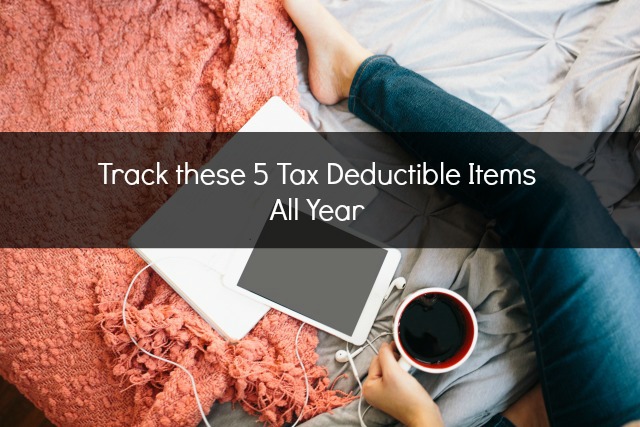Track these 5 Tax Deductible Items All Year
If you’re an employed entrepreneur or self-employed you’re likely giving too much money to taxes. You likely should be writing off a lot more stuff. I didn’t realize the amount of things I could write off for tax deductions. No seriously, you need to be tracking these things and making sure you hand over the numbers to your accountant or tax preparer. It goes way beyond mileage and charitable contributions.
You have to pay estimated income taxes four times a year, on:
- April 15th: income between January 1st – March 31st
- June 15th: income between April 1st – May 31st
- September 15th: income between June 1st – August 31st
- January 15th of following year: income between September 1st – December 31st.
Then like everyone else you file your taxes for the entire year by April 15th of the next year. However, there are a few crucial things you need to be doing right now to decrease your tax burden.
Learn 10 key steps you need to start a business and turn a side hustle into a business.FREE EBOOK: Starting a Business Checklist Guide

Before we begin, let me just say this. I’m not an accountant. Always talk with your accountant and/or tax preparer to see what is applicable to you and your situation.
Alright, here’s a list of tax deductible expenses that you should be tracking all year long and/or discussing with your accountant.
1) Transportation and travel.
You should be tracking mileage for any time you use your car for a business trip, meeting or errand. So that run to the store to pick up materials, yep track it. That drive to meet a potential new client, yep track it. Write down the date, starting location, destination, miles, and purpose. Also keep track of any tolls and parking expenses incurred during the business trip. Keep a log that you update any time you travel for business. You can also use online software such as expensify or mileIQ.
If you rely on public transportation, still keep a log of your transportation expenses. A portion of your monthly bus pass may be deductible. Car rentals, Uber expenses, taxis and subway fare for business purposes are deductible. Track everything when it’s related to business.
Also track travel outside of your base location. For example, say you go to a conference. Your airfare, train fare, taxi, accommodation expenses, and meals costs are deductible. You can also deduct shipping if you needed to ship materials to the location. I had no clue about the shipping!
2) Phone calls.
It’s inevitable. You’ll use your personal phone for business calls. Especially when your cell phone is the only phone you have and you’re starting up. The cell phone doubles as a business phone. Well, did you know you can still deduct some of those phone charges. The business portion can be deducted. So you need to keep clear records of how much you use your phone for business. Be able to distinguish what percentage of calls are business vs. personal. I use a simple excel tracking sheet.
3) Business entertainment.
Depending on your business, you may at times take leads and prospects out to lunch. The standard policy is you pay for the meal. Or perhaps you host a catered business meeting or gala for leads and prospects. They come to eat and learn more about your services, products and programs … maybe enroll. These expenses are tax deductible. Half of the expenses are deductible. Keep track of who you were with, the purpose of the event, where it took place, and when.
4) Education.
All of those courses, webinars, and conferences may be tax deductible. The material must be related to your current business, not education to start a new one. You have to be gaining education to maintain or improve skills needed for your business. If you’re studying a completely new field to start up a new venture then the costs aren’t deductible using this reason. These should be tracked in your financial system, but you may want to keep a separate log as well.
5) Internet.
I had no clue that a portion of my internet could be deducted. If you work on your business regularly from home, then record the number of hours you work on your business. You can write off a percent of internet costs. Track the number of hours you’re working in the business. Keep a log for your accountant. You can this along with your internet bill in order to determine how much can be written off.
Now, here are some deductions you don’t have to track, but are definitely worth the mention and will lower your tax burden.
1) Home office.
Your home office can be written off. You have to have a room that is used solely for business, absolutely nothing else. Once you have a room set up as your office, then you can deduct a portion of rent, utilities, renter’s or home insurance, property taxes, home maintenance, security system, and professional cleaning. The write off is dependent on the physical size of the office. There are two methods. One method is a straight forward $5 per square foot. The second method is to calculate what percent of the home is the office.
2) Online services.
Every business has an online presence or is in the process of creating one. It is crucial to business. Well, those crucial expenses are deductible. Expenses such as your website domain, website hosting, business software, online storage e.g. clouds are all deductible. Yes!
3) Advertising.
Any advertising that is normal for your business and industry is tax deductible. Whoop! As you grow, your marketing and advertising budget has to grow. Well at least those costs lower your tax burden.
Make sure these expenses are clearly and accurately accounted for in your financial tracking system. Don’t make your accountant or tax preparer guess.







This is an awesome blessing, I appreciate you sharing Dr. Maria James.
Thank you! No problem. 🙂
I have the tax deductions. Filing and maintaining receipts is a problem, there are so many, any suggestions? Do you have a special log sheet where you track quarterly expenses? How do you track things if you have multiple sources of income?
Thank you
Juanita
You can use an app such as expensify to track your receipts or mileIQ to track mileage. I used to track expenses using an Excel spreadsheet, but now I use accounting software. This way I can pull up a report easily for any expense. You can try Wave, Freshbooks, Xero, or Quickbooks. They all have apps as well. Wave is free and the others have a monthly fee. For logging my time such as business calls and hours worked in a home office I use a simple Excel spreadsheet. You could have a separate spreadsheet for each source of income if they are for completely different businesses.
I had no idea that simply dedicating a room as the office could lead to it being tax deductible. Thank you!
No problem!